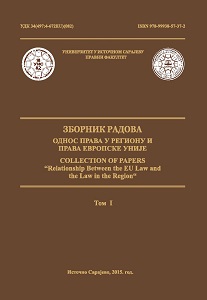Институционална реформа Европске уније и допринос Лисабонског уговора овом процесу
Institutional Reform of the European Union and Contribution of the Lisbon Treaty to this Process
Author(s): Dragan Bataveljić, Blagoje Pušonja
Subject(s): Social Sciences, Law, Constitution, Jurisprudence, EU-Legislation
Published by: Правни факултет Универзитета у Источном Сарајеву
Keywords: Constitutionality; European Union; Lisbon(Reform) treaty; Institutional reform of the EU; Globalization; European federalism;
Summary/Abstract: The author in this work points out the necessity of institutional reforms within the great European family, which became the largest regional organization in the world. The creation of the European Union was due to the development of constitutionality after the Second World War, relations between the political forces, as well as tensions between the two largest pact of that period – Warsaw and the North Atlantic. The development of the world’s constitutionality and modern tendencies are caused drafting the Constitution of the European Union, whose adoption is not completed successfully, so that a solution is found in the Treaty of Lisbon, which is a replacement for this Constitution. This contract is very important for today’s EU institutional image and overcoming so-called „Institutional crisis“, which occurred after an unsuccessful referendum for accepting the European Constitution.Reached agreement and acceptance of Lisbon (Reform) treaty was very important for the introduction of significant innovations in the institutional system of the Union, and in particular for the creation and realization of the rights of all its citizens. The author specifically indicates that the system is extremely complex, complicated, slow, expensive, and very difficult to understand.
- Page Range: 350-365
- Page Count: 16
- Publication Year: 2015
- Language: Serbian
- Content File-PDF

